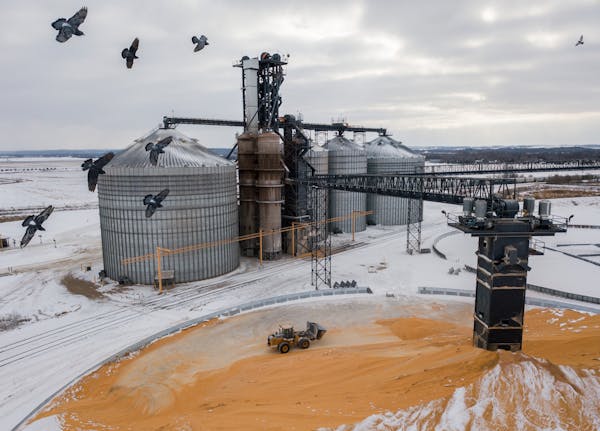China's decision to purchase 1.1 million metric tons of U.S. soybeans, announced Thursday by U.S. officials, had an instant impact in Minnesota, lifting bid prices at grain elevators and sending farmers and grain marketers to their calculators.
Shipping terminals in the Pacific Northwest started accepting soybeans for the first time in months.
Soybean sales to China, the largest buyer of U.S. soybeans, stopped in the summer, driving down prices. Farmers west and northwest of the Twin Cities, where the grain elevators and railroads are designed to deliver soybeans to the Pacific Northwest, were at a particular disadvantage.
China's purchase, announced by the U.S. Department of Agriculture, came after President Donald Trump and China's President Xi Jinping agreed to a 90-day truce in the trade war.
"It's a nice first step. It's not a bad development, it's a good development," said Mike Steenhoek, executive director of the Iowa-based Soy Transportation Coalition.
The most concrete effects were felt to the west of the Twin Cities.
There's always a gap between the price on the Chicago Board of Trade and the price offered to farmers at the local elevator, and throughout the trade war that gap — the basis — has been wider the closer to China the soybeans are grown. Some elevators in western Minnesota and North Dakota were offering $1.70 per bushel less than the Board of Trade price. That disadvantage decreased Thursday.
"Our basis has gotten better by 20 cents at least," said Kelly Longtin, the general manager of Red River Grain Co. in Breckenridge, Minn.
But in a typical year, the U.S. exports 35 million metric tons of soybeans to China, so the sales announced this week amount to about 3 percent of typical soybean sales to China. It was not enough to sustain a rally in soybean prices, which closed down 12 cents at $9.07 per bushel Thursday. Farmers and elevator operators weren't sure what to make of the news.
"Is this for real, or is this just a flash in the pan?" Longtin asked. He added, "The tariff's not off."
Farmers are still reluctant to sell beans at current prices. For grain elevators, selling the beans to the coast is complicated because they must navigate fluctuations in the basis to turn a profit.
Reuters reported Wednesday that the soybean sellers were Minnesota-based Cargill and CHS Inc., and St. Louis-based Louis Dreyfus Co. Private exporters must report large sales of commodities to the U.S. Department of Agriculture, but the sellers are not disclosed.
A spokesman for CHS declined to say whether the company sold soybeans to China but pointed to a statement by John Griffith, the firm's senior vice president for global grain marketing.
In it, Griffith noted China imports more U.S. beans than all other countries combined. "On behalf of our farmer-owners, we are focused on encouraging resolution of all trade barriers," he said.
Steenhoek, of the Soy Transportation Council, said it will take a while for empty ships and trains full of soybeans to get to ports and start moving the soybeans across the ocean to China.
"It's not just like turning on a faucet," he said.
Reuters reported that the Chinese buyers of the soybeans are two state-owned enterprises — Sinograin and Cofco — and Steenhoek said that the majority of Chinese buyers are private companies who won't purchase U.S. soybeans as long as the 25 percent tariff is in place.
The purchases announced this week may be a gesture of goodwill from the Chinese government and may be a way to replenish dwindling supply there with the South American soybean harvest still at least three months away.
"If you're a Chinese buyer, the South American harvest, those dates are dates you have circled on your calendar," Steenhoek said.
Adam Belz • 612-673-4405 Twitter: @adambelz
